译林版英语预备教材课件Lesson 7 Enjoy our days
牛津译林初中英语七上《StarterLesson 7 Enjoy our days》PPT课件 (2)

句型转换 1.Our classes begin at 8:00.(同义句) _W_e____ __h_a_v_e__ our classes at 8:00
2. We go to school from Monday to Friday.(同上
We often go to school_f_iv_e__da_y_s__a_w_e_e_k__. 3.On Thursday we have an art lesson (提问 _W_h_a_t_le_s_s_o__n _d_o_y_o_u__ha_v_eon Thursday?
at + clock time
on + days of the week on + dates on + special days
A: When is China’s Teachers’ Day? B: It’s on 10 September. A: When was the first Teachers’ Day? B: It was in 1985. A: Do teachers have a holiday that day? B: No, they don’t. They need to work on Teachers’ Day.
1.在那天上电脑课
have Computer lessons that day 2.回信
write back. 3.尼克的一周 Nick’s week 4.我们课开始于8 Our classes begin at eight o’clock 5.我们在周二上音乐课 We have a Music lesson on Tuesday
yòu shuāng ruòzhuó 又双叒叕
牛津译林版七上Starter Lesson 7 Enjoy our days (第四课时)教学设计

牛津译林版七上Starter Lesson 7 Enjoy our days (第四课时)教学设计一. 教材分析本课是牛津译林版七年级上册的Starter Lesson 7 “Enjoy Our Days”,主要讲述日常活动以及表达喜好的句子结构。
通过本课的学习,学生能够掌握日常活动的词汇,如“play chess, play football, read books”等,同时能够运用“-ing”结尾的动词形式表达正在进行的活动。
此外,学生还能够学会使用“I like…”表达自己的喜好。
二. 学情分析七年级的学生已经掌握了基本的英语语法和一定数量的词汇,具备一定的听说读写能力。
但部分学生在发音和听力方面还存在困难,需要教师的耐心引导和反复练习。
此外,学生对日常活动的词汇可能较为陌生,需要在课堂上进行充分的操练和巩固。
三. 教学目标1.知识目标:–能正确拼读和书写日常活动词汇,如“play chess, play football, read books”等。
–能理解并运用“-ing”结尾的动词形式表达正在进行的活动。
–能用“I like…”表达自己的喜好。
2.能力目标:–能在真实情境中运用所学词汇和句型进行交流。
–能提高听力和口语表达能力。
3.情感目标:–培养学生对日常活动的兴趣,增强学习英语的积极性。
四. 教学重难点•日常活动词汇的掌握。
•“-ing”结尾的动词形式的使用。
•“I like…”句型的表达。
•部分日常活动词汇的拼写和发音。
•在实际情境中灵活运用所学词汇和句型。
五. 教学方法1.任务型教学法:通过完成各种任务,激发学生的学习兴趣,提高学生的参与度。
2.情境教学法:创设真实的情境,让学生在实际语境中学习、运用英语。
3.交际法:鼓励学生积极参与课堂交际活动,提高口语表达能力。
六. 教学准备1.教材:牛津译林版七年级上册Starter Lesson 7 “Enjoy Our Days”。
牛津译林初中英语七上《StarterLesson 7 Enjoy our days》word教案 (1)

亭湖新区实验学校集体备课教案备课人:胡荣艳审核人:蒋雷总课题Lesson 7 Enjoy our days 总课时 4 第 2 课时课题Listening & Speaking 课型New教学目标In this period, the Ss are supposed to master the knowledge in Part B, including: Vocabulary, Grammar and task1).Knowledge Aims:1. Vocabulary: the new words of these four parts2. Speaking: When do you get up ... ?2).Competence Aims: 1. Learn the new words in the part.2. Learn how to use “at/in/on” etc.3. Master the rules of it.3).Mor al Aims: Enjoy the seasons of the year.教学重难点1).Key points: 1. Revise and practice the sentence structure: “Whenis...?”2. Master the rules of using “at/in/on” and be able tofinish the task freely2).Difficult points: 1.Be able to finish the task freely and speak fluently2. Learn the rules by heart.教学过程教师活动二次备课Step1导入B Seasons of the year教师设置情境进行导入。
T: When do you get up in the morning? When do you go to school? When do your classes begin?简单介绍自己一周的学习和生活。
译林版初一英语7A预备课程Lessons7 Enjoy our days 教案
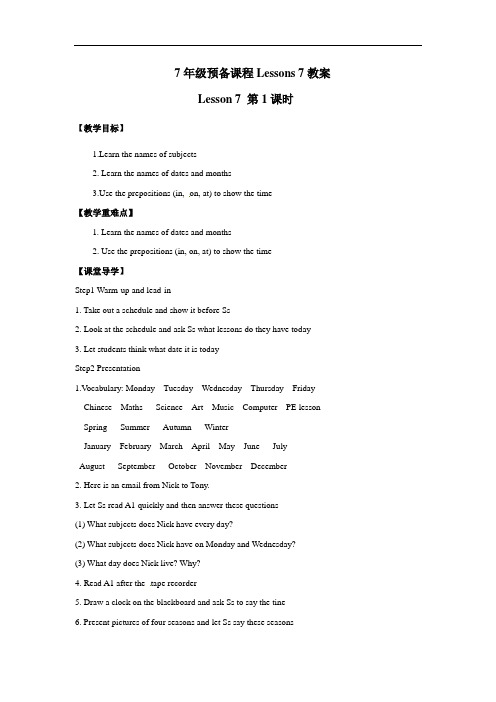
7年级预备课程Lessons 7教案Lesson 7 第1课时【教学目标】1.Learn the names of subjects2. Learn the names of dates and monthse the prepositions (in, on, at) to show the time【教学重难点】1. Learn the names of dates and months2. Use the prepositions (in, on, at) to show the time【课堂导学】Step1 Warm-up and lead-in1. Take out a schedule and show it before Ss2. Look at the schedule and ask Ss what lessons do they have today3. Let students think what date it is todayStep2 Presentation1.V ocabulary: Monday Tuesday Wednesday Thursday Friday Chinese Maths Science Art Music Computer PE lesson Spring Summer Autumn WinterJanuary February March April May June JulyAugust September October November December2. Here is an email from Nick to Tony.3. Let Ss read A1 quickly and then answer these questions(1) What subjects does Nick have every day?(2) What subjects does Nick have on Monday and Wednesday?(3) What day does Nick live? Why?4. Read A1 after the tape recorder5. Draw a clock on the blackboard and ask Ss to say the tine6. Present pictures of four seasons and let Ss say these seasons7.Listen to B1 and finish B28. Give a summary of the usage of prepositionsin: months and seasonson: days of the weekat: clock timeStep3 Practice1.I often go to school at ________. It is _________ (early/ late)2.I often __________ on Saturday o r Sunday.3.Nick gets up early in the morning every day. (T/F)lie often goes to bed at 9:00 in autumn. (T/F)5.________ night __________ summer ___________9:30_________January__________Saturday___________1958Step4 Homework Finish the exercise paperLesson 7 第2课时【教学目标】1.Learn how to express the daily activities2. Learn to describe the Ss’ life in school and their extracurricular life3. Learn to write a short composition about their life【教学重难点】1. Learn to describe the Ss’ life in school and their extracurricular life2. Learn to write a short composition about their life【课堂导学】Step1 RevisionT: What subjects do you have on Monday?S1: We have English, Maths and Chinese.T: What season is January in?S2: It’s in winter.Step2 Lead-in1.Present some pictures about Ss’s daily life2.Ss make a dialogue in pairs about these pictures3.Act the dialogue outStep3.Presentation1.Write the sentence pattern “What time do you…?” on the blackboard2.Play the tape recorder about Part C3. List the phrases about time and let Ss pay attention to the expressions: at six forty ; at four o’clock; at half past six.Step4 Practice1.Read Part D and then finish the blank2.Finish the conversation:------ What time do you get up every day?------I_______________________________.-------What time do you go for a summer holiday?-------I______________________________________.3.Write a letter about your school days to your good friend4.Work in groups of four to do a survey about the timetable of your family members.Q1: When do your parents go to work every day?Q2: What time does your mother/father get up in the morning?Q3: What time does your mother/father cook dinner?Step5 Homework1.Finish the exercise paper。
牛津译林预备版七上Lesson 7 Enjoy our days
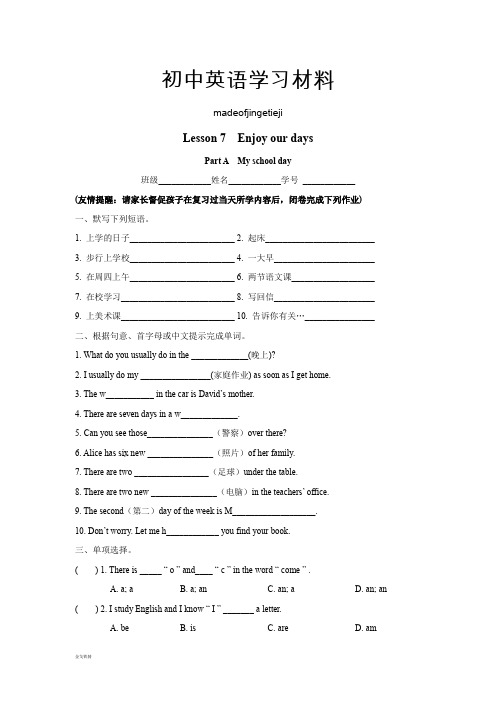
初中英语学习材料madeofjingetiejiLesson 7 Enjoy our daysPart A My school day班级____________姓名____________学号____________(友情提醒:请家长督促孩子在复习过当天所学内容后,闭卷完成下列作业)一、默写下列短语。
1. 上学的日子________________________2. 起床_________________________3. 步行上学校________________________4. 一大早_______________________5. 在周四上午________________________6. 两节语文课___________________7. 在校学习__________________________8. 写回信_______________________9. 上美术课__________________________ 10. 告诉你有关…________________二、根据句意、首字母或中文提示完成单词。
1. What do you usually do in the _____________(晚上)?2. I usually do my ________________(家庭作业) as soon as I get home.3. The w___________ in the car is David’s mother.4. There are seven days in a w_____________.5. Can you see those_______________(警察)over there?6. Alice has six new _______________(照片)of her family.7. There are two _________________(足球)under the table.8. There are two new _______________(电脑)in the teachers’ office.9. The second(第二)day of the week is M___________________.10. Don’t worry. Let me h____________ you find your book.三、单项选择。
牛津译林版七上Starter Lesson 7 Enjoy our days 教学设计

牛津译林版七上Starter Lesson 7 Enjoy our days 教学设计一. 教材分析《牛津译林版七上Starter Lesson 7 Enjoy our days》是一篇介绍日常活动为主题的文章。
通过本文,学生可以学习到日常活动的表达方式,以及一般现在时的用法。
文章内容贴近学生的生活,易于引起学生的兴趣和共鸣。
二. 学情分析七年级的学生已经掌握了基本的英语语法和词汇,具备一定的听说读写能力。
但部分学生对日常活动的表达方式还不够熟悉,需要通过本文的学习来进一步巩固。
同时,学生需要掌握一般现在时的用法,这对他们来说是一个新的语法点。
三. 教学目标1.学生能够理解文章的主旨大意,掌握日常活动的表达方式。
2.学生能够运用一般现在时描述自己的日常活动。
3.学生能够提高阅读理解能力,培养良好的阅读习惯。
四. 教学重难点1.重点:日常活动的表达方式,一般现在时的用法。
2.难点:一般现在时的用法,以及如何运用该时态描述日常活动。
五. 教学方法采用任务型教学法,让学生在真实的语境中学习和使用英语。
通过小组合作、讨论等方式,激发学生的学习兴趣,提高学生的参与度。
同时,运用情境教学法,创设日常活动的场景,帮助学生理解和运用所学知识。
六. 教学准备1.教师准备PPT,包含文章内容、图片、视频等素材。
2.准备日常活动的词汇卡片,用于操练和巩固环节。
3.准备一份一般现在时的用法指南,帮助学生理解和掌握。
七. 教学过程1.导入(5分钟)教师通过提问方式引导学生谈论日常活动,如:What do you usually do in your free time? 学生回答后,教师总结并板书关键词。
2.呈现(10分钟)教师通过PPT展示文章内容,引导学生阅读。
在阅读过程中,教师提问学生关于文章内容的问题,如:What does the writer usually do in his free time? 学生回答后,教师给予反馈。
2019-2020年牛津译林版英语七年级上预备课程Lesson 7 Enjoy our days巩固辅导九十五
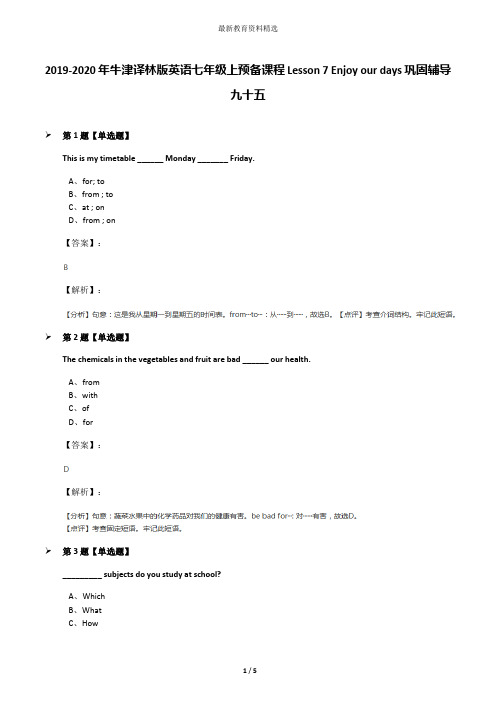
【解析】:
It is very cold and snowy in D______ in Harbin every year.
【答案】:
【解析】:
The hottest season is ______ , and the coldest is winter.
【答案】:
【解析】:
The smiths are on ______ (假日) in Hangzhou.
2019-2020年牛津译林版英语七年级上预备课程Lesson 7 Enjoy our days巩固辅导九十五_______ Friday.
A、for; to
B、from ; to
C、at ; on
D、from ; on
【答案】:
B、What
C、How
D、When
【答案】:
【解析】:
They go to school at 7:00 am. (对划线部分提问)
______ ______ do they go to school ?
【答案】:
【解析】:
Nick has a computer in his room. (改为一般疑问句)
______ Nick ______ a computer in his room?
【答案】:
【解析】:
This is a photo of my father and mother. (变为同义句)
This is a photo of ______ ______.
【答案】:
【解析】:
We study Chinese, Maths and English at school. (对划线部分提问)
牛津译林初中英语七上《StarterLesson 7 Enjoy our days》word教案

Lesson 7 Enjoy our days实用文档 1教学目标知识目标1、掌握介词的用法2、掌握星期和月份的名词表达教学方法discussionpractice能力目标To complete an article with the information情感目标To make communications w ith the related topics教材分析重点掌握介词的用法难点熟练使用介词教学过程一.自主质疑与预习交流1 教师(出示钟面)问:What is this?帮助学生回答:It’s a clock.(板书clock,并注出音标,带读)2 学生(出示钟面)问:What time is it?(板书并带读)帮助学生回答:It’s seven.教师接着学生回答:Yes,it’s seven o’clock.3集体操练What time is it? It’s ….(整点时间)4 学生两人一组,操练整点时间的英语表达。
5 教师让几组学生表演继续以此方法呈现非整点时间,特别提醒学生注意:①非整点时间不能用o’clock ②几点零几分 0读着字母O音二.教师质疑与情境创设1 教师呈现一张学校的作息时间表,指第一课开始的时间说:Classes begin at seventwenty-five.将begin写在黑板上,学生猜测词义,带读。
2 教师指着当天的日课表说:We begin our English lesson at 7:25.We have ourEnglish lesson from 7:25 to 8:10.让学生模仿说出这两句。
再用此方法描述Chinese和Maths, PE等课程。
3 教师仍然使用日课表和作息时间表,指着活动课时间说:We can play games from个人二次备课:个人二次备课:实用文档 2。
牛津译林预备版七上Lesson 7 Enjoy our days

Lesson 7 Enjoy our daysPart C & Part D班级____________姓名____________学号____________(友情提醒:请家长督促孩子在复习过当天所学内容后,闭卷完成下列作业)一、用所给词的适当形式填空。
1. I __________________ (not go) to school on Saturdays.2. We often go to work with ___________ (they).3. She sometimes helps me _____________ (clean) the house.4. What about ______________ (watch) TV at home?5. Millie gets up early and _____________ (play) basketball.6. Sandy wants _________ (go) to the supermarket.7. It’s ______________ (wind) today. Let’s fly kites in the playground.8. Let _________ (they) go to the zoo.9. Jim _____________ (have) a computer lesson every day.10. We like _____________ (play) football and basketball.二、根据句意及首字母提示,补全单词。
1. You must eat____________(蔬菜)every day, and they are good for us.2. We always eat___________(午餐)in the kitchen.3. This food is not very h__________. You can’t eat it too much.4. ----What f_______ do you like best?---Rose.5. ---What do you have for breakfast?---______________(面包)and milk.6. S_________ some drinks are bad for us. So we shouldn’t drink them too often.7. ----What do you have for b________?----Some eggs and milk.三、句型转换。
最新译林牛津版初中英语七年级上册StarterLesson 7 Enjoy our days公开课教学设计 (3)
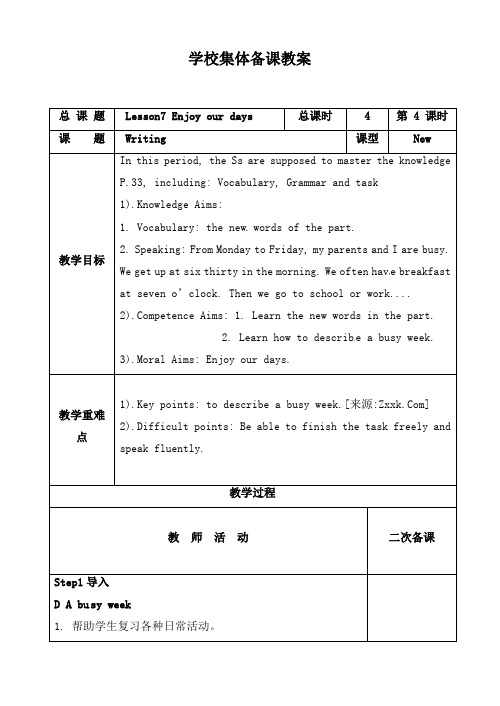
总课题
Lesson7 Enjoy our days
总课时
4
第4课时
课题
Writing
课型
New
教学目标
In this period, the Ss are supposed to master the knowledge P.33, including: Vocabulary, Grammar and task
Step2写作
教师指导学生根据课 本上的提示进 行写作,篇幅30到40词。六分钟后,把学生分成四人小组进行讨论,然后让学生上台朗读作文,教师做建设性的点评。
Sample writing
From Monday to Friday, my parents and I are busy. We get up at six thirty in the morning. We often have breakfast at seven o’cloc k. Then we go to school or work.
2).Competence Aims: 1. Learn the new words in the part.
2. Learn how to describ e a busy week.
3).Moral Aims: Enjoy our days.
教学重难点
1).Key points: to describe a busy week.[来源:]
have breakfast/wash clothes/watch TV/write emaificult points: Be able to finish the task freely and speak fluently.
译林新版 预备教材lesson 课件Lesson Enjoy our days artB 公开课
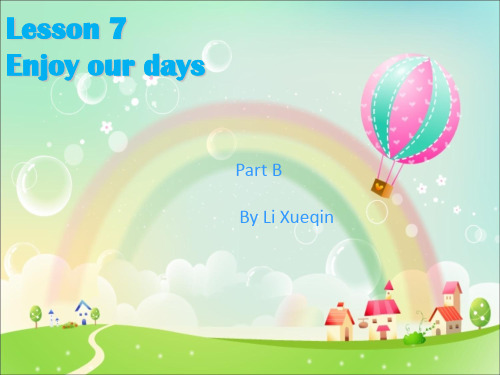
4.Students have a short holiday in suFmmer.
long
Read and retell Rule in + months and seasons In autumn, it is cool at night. I often go to bed at 9:30 to have a good sleep. I do not go to bed late. The Chinese New Year is in winter. It is in January or February. It is cold and it sometimes snows. It is warm and windy in spring. People like flying kites on Saturday or Sunday in the open air. It is hot in summer. Students do not go to school in July and August. They have a long holiday.
English Art Music season: spring summer autumn winter
What’s the song about?
• How many seasons are there in a year? • What are they?
spring
summer autumn winter
We use “ in “before years. We use “ on “before dates and special days.
牛津译林预备版七上Starter Lesson7 Enjoy our days
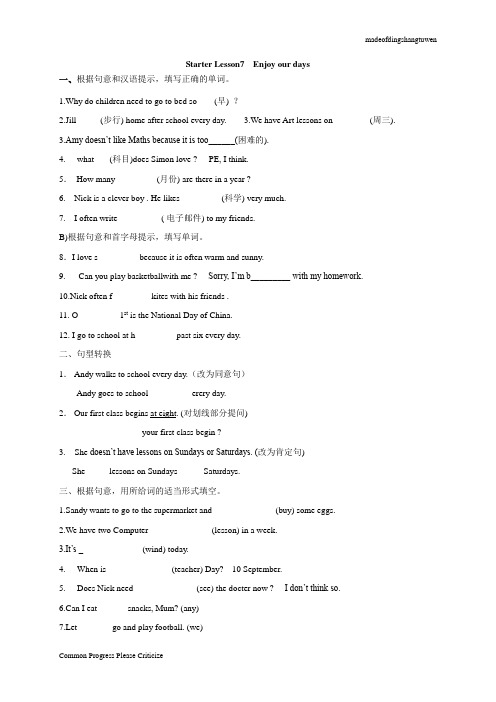
Starter Lesson7 Enjoy our days一、根据句意和汉语提示,填写正确的单词。
1.Why do children need to go to bed so____(早) ?2.Jill _____(步行) home after school every day.3.We have Art lessons on ________(周三).3.Amy doesn’t like Maths because it is too______(困难的).4.----what ___(科目)does Simon love ?----PE, I think.5.How many _________(月份) are there in a year ?6. Nick is a clever boy . He likes _________(科学) very much.7. I often write _________ ( 电子邮件) to my friends.B)根据句意和首字母提示,填写单词。
8.I love s_________ because it is often warm and sunny.9. --- Can you play basketballwith me ?--- Sorry, I’m b_________ with my homework.10.Nick often f_________kites with his friends .11. O_________ 1st is the National Day of China.12. I go to school at h_________ past six every day.二、句型转换1.Andy walks to school every day.(改为同意句)Andy goes to school ____ ___ erery day.2.Our first class begins at eight. (对划线部分提问)_____ _____ _____your first class begin ?3.She doesn’t have lessons on Sundays or Saturdays. (改为肯定句)She _____lessons on Sundays _____ Saturdays.三、根据句意,用所给词的适当形式填空。
牛津译林初中英语七上《StarterLesson 7 Enjoy our days》PPT课件 (1).ppt

4。 She has _c_h_i_c_k_e(n 鸡肉) tomatoes, French fries for dinner.
5.There are 50 _w_o__m_e_n_(女人) in the meeting
6.You will have a _h_e_a_lt_h_y( health) lifestyle if you exercise every day.
3.We study Chinese, Maths, English
and A_r_t____ lessons.
4.---What’s you favourite ubject s________? ---It is English, I think.
5.The day after Wednesday is T__h_u_rs_d__a_y___
5.tooth teeth 6.boy boys 7.watch watches
8.box boxes 9. class classes
14.sheep sheep 15.wife wives 16.knife knives 17.child children
18.man men
词汇练习
1.The students are going to buy some _fl_o_w_e_r_s_(鲜花) for their teachers 2.There were not enough v_e_g_e_t_a_b_les (蔬菜) at home yesterday.
6.These exercises are e__a_sy__ for you. They are for Grade 6 students
牛津译林版七上StarterLesson7Enjoyourdays说课稿
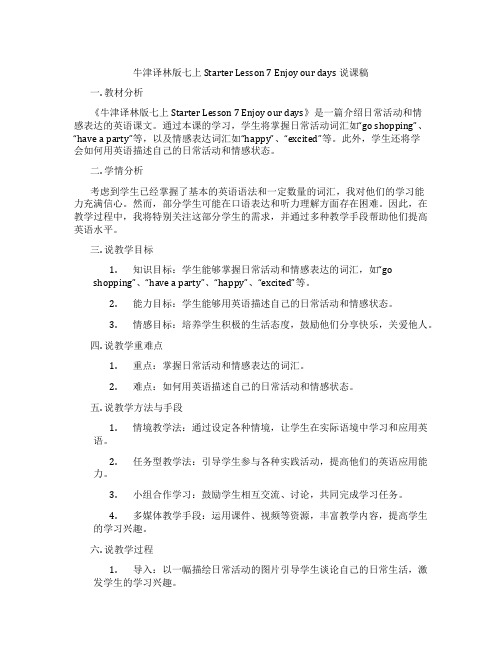
牛津译林版七上Starter Lesson 7 Enjoy our days 说课稿一. 教材分析《牛津译林版七上Starter Lesson 7 Enjoy our days》是一篇介绍日常活动和情感表达的英语课文。
通过本课的学习,学生将掌握日常活动词汇如“go shopping”、“have a party”等,以及情感表达词汇如“happy”、“excited”等。
此外,学生还将学会如何用英语描述自己的日常活动和情感状态。
二. 学情分析考虑到学生已经掌握了基本的英语语法和一定数量的词汇,我对他们的学习能力充满信心。
然而,部分学生可能在口语表达和听力理解方面存在困难。
因此,在教学过程中,我将特别关注这部分学生的需求,并通过多种教学手段帮助他们提高英语水平。
三. 说教学目标1.知识目标:学生能够掌握日常活动和情感表达的词汇,如“goshopping”、“have a party”、“happy”、“excited”等。
2.能力目标:学生能够用英语描述自己的日常活动和情感状态。
3.情感目标:培养学生积极的生活态度,鼓励他们分享快乐,关爱他人。
四. 说教学重难点1.重点:掌握日常活动和情感表达的词汇。
2.难点:如何用英语描述自己的日常活动和情感状态。
五. 说教学方法与手段1.情境教学法:通过设定各种情境,让学生在实际语境中学习和应用英语。
2.任务型教学法:引导学生参与各种实践活动,提高他们的英语应用能力。
3.小组合作学习:鼓励学生相互交流、讨论,共同完成学习任务。
4.多媒体教学手段:运用课件、视频等资源,丰富教学内容,提高学生的学习兴趣。
六. 说教学过程1.导入:以一幅描绘日常活动的图片引导学生谈论自己的日常生活,激发学生的学习兴趣。
2.新课呈现:通过课件展示本文主要词汇和句子,让学生初步感知文本内容。
3.课堂活动:设计各种实践活动,如角色扮演、小组讨论等,让学生在实际语境中运用所学知识。
4.巩固练习:布置相关习题,检查学生对知识的掌握程度。
牛津译林版七年级英语教学课件:starterLesson7Enjoyourdays(3)

What time do you get up/ have breakfast/ go to
school/ have lunch/ have dinner/ go to bed every day?
What time does your mum/ dad cook dinner every day?
F
F
( )
T
Activity
Get up
Have breakfast Go to school
Time
Have classes
Zx xk
Have lunch Do after-school activities Go home Have dinner Do homework Go to bed
When do your parents go to work every day?
What time does your mother/ father get up in the morning?
What time does your mother/ father cook dinner?
A busy week
From Monday to Friday, my parents and I are busy. We get up ___________ in the morning. We often have breakfast at ____________. Then we go to school or work. I come back from school at ________. My parents often get home __________. Then they _________. In the evening, my parents ___________ and I ____________. On Friday evening, my parents often _____________ and I _____________.
最新牛津译林版英语七年级上册《StarterLesson 7 Enjoy our days》PPT课件 (4)

come back from school 4.到家
get home
5.在周五晚上
on Friday evening
最新初中英语精品课件设计
最新初中英语精品课件设计
Ask and answer with your partner about a busy week.
3.Don’tp_la_y____(play) football here.
4Lily and Nick __a_re____(be) classmates. And they are good friends.
5.Their c_l_a_s_s_e_s_(class) begin at seven every morning最.新初中英语精品课件设计
10.Lily and Lucy often d_o_____ sports at the weekend.
最新初中英语精品课件设计
1.He often _g_e_t_s_(get) up very late on Sundays.
2. _D_o_e_s_ David___g_o__(go) to bed at ten every evening?
1.Do you have a busy week? 2.What time do you/ your parents usually get up? 3.What time do you have your lunch? 4.What time do you get home in the evening 5.What time does your mother wash clothes 6.What do you and your parents do on Sundays? 最新初中英语精品课件设计
【优课】牛津译林初中英语七上《StarterLesson 7 Enjoy our days》PPT课件 (4)

4Lily and Nick __a_re____(be) classmates. And they are good friends.
5.Their c_l_a_s_s_e_s_(class) begin at seven every morning.
词汇练习
1.---Whose_c_lo_t_h_e_s(衣服) are these? --- Sorry, I don’t know.
2.My father is very _b_u_s_y__(忙),he has a lot of things to do.
3.My uncle often _w_a_t_c_h_es(wash) his car on Sunday.
1.Jim_h_a_s___(have) an art lesson today.
2. We need t_o__s_le_e_p (sleep) about eight hours every day. 3.Daniel _d_o_e_s_n_’__t_w_a_t_c_h__(not watch) TV in the evening from Monday to Friday.
Part D
复习巩固
1.Sometimes it s_n__o_w_s(下雪) in my hometown in winter. 2. He likes _t_e_ll_in_g_(告诉) us about his life
3. My mother tw_a_s_h___(洗) the dishes, but my father does.
Hello, my name is…., From Monday to Friday , my parents and I are busy…
- 1、下载文档前请自行甄别文档内容的完整性,平台不提供额外的编辑、内容补充、找答案等附加服务。
- 2、"仅部分预览"的文档,不可在线预览部分如存在完整性等问题,可反馈申请退款(可完整预览的文档不适用该条件!)。
- 3、如文档侵犯您的权益,请联系客服反馈,我们会尽快为您处理(人工客服工作时间:9:00-18:30)。
kites on Saturday or Sunday in the open air.
It is hot in summer. Students do not go to scho in July and August. They have a long holiday.
at + clock time
3. Our new term starts _____ in September.
4. My mother is not at home. She will come back
____ at 3 p.m. 5. What will you do ______ May Day? I will help my on parents clean the house.
in spring and 6. These birds fly to the north _____
come back to the south ____ in autumn.
A busy week
From Monday to Friday, my parents and I are busy. We get up at_________in the morning. We often have breakfast at _______. Then we go to school or work. I come back from school at ________. My parents often get home __________. Then they _________. In the evening, my parents ___________ and I ____________. On Friday evening, my parents often _____________ and I _____________.
Mon. Tue. Wed. Thur. Fri.
Chinese, English _______, Maths Science Art lessons _______________ Computer lessons Music _______________ PE _______________ Nick has … on … We have … on …
1. 我们在春天植树。
2. A: 你每天几点钟写作业? B: 我每天7点半写作业。
3. 我想在儿童节和爸爸妈妈一起去看电影。
4. 2015年,米莉将去美国学习。 5. 星期六和星期天我们不上学。
late. The Chinese New Year is in winter. It is in Janua or February. It is cold and it sometimes snows.
It is warm and windy in spring. People like flyin
Our classes begin at eight. 我们八点钟开始上 课。 We have Art lessons on Tuesday. 我们星期二有艺术课。 What subjects do you study at school? 你在学校学什么课程? It is warm and windy in spring. 春天温暖多风。 Students do not go to school in July and August. 学生在七月和八月不上课。 What time do you get up in the morning? 你早晨几点起床? I often get up at six forty. 我通常六点四十起床。
What time do you get up every day? What time do you have lunch? What time do you do your homework?
at + clock time
Talk with your partner. What time do you …?
on + days of the week on + dates on + special days in + years
A: When is China’s Teachers’ Day?
B: It’s on 10 September.
A: When was the first Teachers’ Day?
on + days of the week on + dates on + special days
in + months and seasons in + years
in 1998. My birthday is ____ on 3rd May. 1. I was born ____
2. We always fly kites in the park ______ Sundays.A: Do teachers have a holiday that day? B: No, they don’t. They need to work on Teachers’ Day.
in + months and seasons In autumn, it is cool at night. I often go to bed at 9:30 to have a good sleep. I never sleep
